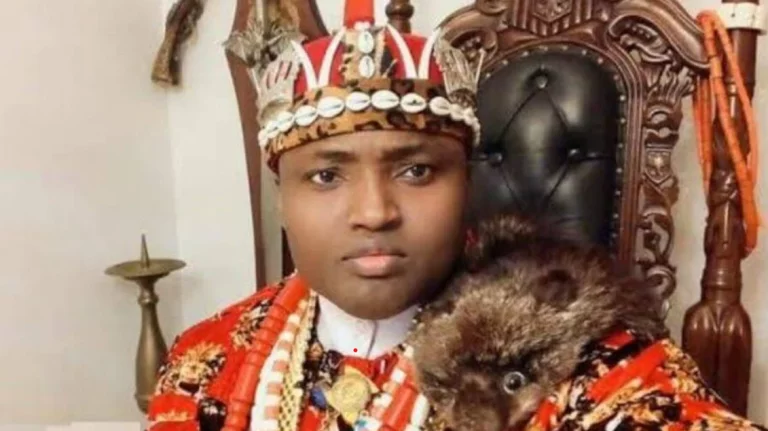A FINNISH court has sentenced Simon Ekpa, the self-styled leader of the Indigenous People of Biafra (IPOB) Government in Exile, to six years in prison for terrorism-related offences. The ruling has been welcomed by Nigerian officials, who accuse Ekpa of inciting deadly unrest in the country’s southeast.
The Päijät-Häme District Court in Lahti ruled that Ekpa had engaged in ‘public incitement to commit a crime with terrorist intent’, using social media to broadcast messages that prosecutors said directly fuelled violence in Nigeria.
The judgement, first reported by Finnish broadcaster Yle, marks one of the most high-profile cases in Europe involving an African separatist leader accused of instigating extremist activity abroad.
Arrest and conviction
Ekpa, who has lived in Finland for years, was arrested by Finnish police on November 21, 2024, following a probe by the Finnish National Bureau of Investigation (NBI).
Authorities linked his online broadcasts and posts to attacks and insecurity in Nigeria’s southeast, where separatist violence has intensified. Prosecutors argued that his videos and live streams played a central role in mobilising unrest, including assaults on civilians, police and infrastructure.
READ ALSO:
CAC Shifts New Fee Implementation To October 1
FRSC Warns Against Night Travel, Drunk-Driving In ‘Ember Months’ Campaign
Dangote Group Commiserates With Phyna, Family Over Ruth Otabor’s Death
She Hid Cocaine In Fake Pregnancy, Widow Arrested, NDLEA Gives Details
The court found that the charges covered a three-year period between August 2021 and November 2024, during which Ekpa’s rhetoric grew more radical. In addition to the jail term, NBI confirmed it had frozen Ekpa’s assets as well as those of his associates and related companies, disrupting what investigators described as his support networks.
Nigerian government reaction
Officials in Abuja welcomed the ruling as a long-awaited step towards accountability. A senior aide at Nigeria’s Ministry of Justice told Africa Briefing that the sentence was ‘a clear validation of what Nigeria has maintained for years — that Simon Ekpa has been orchestrating violence from abroad’.
Nigeria has long accused Ekpa of directing armed groups loyal to IPOB, which the government has outlawed as a terrorist organisation. Security forces blame separatist militants for attacks on electoral offices, markets and police stations across the southeast.
‘The Finnish court’s decision sends a powerful message that no one can hide behind foreign borders to destabilise our country,’ the aide said.
Diaspora divides
Ekpa’s supporters in the Igbo diaspora reacted angrily, with some claiming the verdict was politically motivated. In online forums, pro-Biafra activists described him as a freedom fighter unfairly targeted for advocating self-determination.
But others within the Nigerian community in Europe urged calm. A Helsinki-based Igbo community leader told local media that Ekpa’s rhetoric had ‘brought nothing but suffering to ordinary people back home’, and that his conviction might reduce tensions.
IPOB and unrest in Nigeria
The IPOB movement, led for years by detained activist Nnamdi Kanu, has repeatedly clashed with Nigerian authorities. While IPOB insists it seeks a peaceful referendum on independence for the southeast, splinter groups and armed factions have been linked to violent campaigns against state institutions.
The Nigerian government banned IPOB in 2017, designating it a terrorist organisation. Since then, separatist unrest has deepened, with hundreds killed in clashes between militants and security forces.
Ekpa, once an ally of Kanu, declared himself the leader of IPOB’s ‘government in exile’ after a bitter split in the movement. Nigerian officials accuse him of using his base in Finland to broadcast inflammatory messages calling for civil disobedience and violent enforcement of so-called ‘sit-at-home’ protests that paralysed parts of the southeast.
European legal reach
The case underlines the growing reach of European counterterrorism laws when extremist activity abroad is traced back to diaspora figures operating online. Legal experts noted that the ruling could set a precedent for prosecuting individuals whose digital activity directly incites violence outside Europe’s borders.
Finnish prosecutors said the court’s judgement made clear that ‘freedom of speech does not extend to incitement of terrorism’, particularly when statements lead to real-world harm.
Looking ahead
Ekpa is expected to appeal the six-year sentence, though his lawyers have yet to comment publicly. Meanwhile, Nigerian authorities are pressing for further international cooperation to curb what they call ‘diaspora-driven extremism’.
For many in southeastern Nigeria, the case is likely to intensify debate about the role of diaspora leaders in shaping events at home. As one Enugu-based analyst told Africa Briefing, ‘This ruling will not end separatist agitation, but it may weaken the influence of someone who has been using distance as a shield while fuelling violence from afar.’





